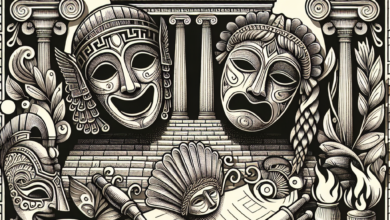Ancient Greek mythology is a fascinating and complex system of beliefs that has influenced art, literature, philosophy, and religion for centuries. The origins of these myths can be traced back to the early civilizations of ancient Greece, where they were used to explain natural phenomena, human behavior, and the mysteries of the world.
The study of Greek mythology is essential for understanding the culture and beliefs of the ancient Greeks. The myths provided a framework for understanding the world around them and played a crucial role in shaping their society. They were passed down through generations through oral storytelling, and were later recorded in written form by Greek poets such as Homer and Hesiod.
One of the earliest recorded examples of Greek mythology is found in the epic poems of Homer, the Iliad and the Odyssey. These poems tell the stories of the Trojan War and the adventures of the hero Odysseus as he makes his way back to his homeland of Ithaca. The mythology in these poems is rich and elaborate, featuring a pantheon of gods and goddesses who play key roles in the lives of mortals.
The mythology of ancient Greece is characterized by its anthropomorphic gods and goddesses, who possess human-like qualities and emotions. The chief deity in the Greek pantheon is Zeus, the king of the gods and the ruler of Mount Olympus. He is often depicted as a powerful and authoritative figure, hurling thunderbolts from the sky and presiding over the affairs of gods and mortals alike.
Other prominent gods and goddesses in Greek mythology include Hera, the queen of the gods and Zeus’s wife; Poseidon, the god of the sea; Athena, the goddess of wisdom and warfare; and Apollo, the god of music, poetry, and healing. These deities interact with humans in various ways, shaping their destinies and influencing their actions.
The myths of ancient Greece also feature a cast of legendary heroes and monsters, whose exploits were the subject of countless stories and legends. One of the most famous heroes in Greek mythology is Heracles, or Hercules, a demigod known for his superhuman strength and courage. He is credited with completing the Twelve Labors, a series of dangerous tasks assigned to him by King Eurystheus.
Another well-known hero in Greek mythology is Perseus, who famously slayed the monstrous Gorgon, Medusa, and rescued the princess Andromeda from a sea monster. These heroes and their adventures served as moral lessons for the ancient Greeks, teaching them about the value of courage, loyalty, and perseverance.
The myths of ancient Greece were not only used to explain natural phenomena and human behavior, but also to provide a sense of order and meaning in a chaotic world. The gods and goddesses in Greek mythology represented various aspects of the natural world, such as the sun, the sea, and the earth. By attributing human-like qualities to these deities, the ancient Greeks were able to make sense of the forces of nature and their own place in the world.
In addition to explaining the mysteries of the world, Greek mythology also served as a form of religious belief for the ancient Greeks. They worshipped their gods and goddesses through rituals and sacrifices, seeking favor and protection in return for their devotion. Temples were built in honor of the gods, and festivals were held to celebrate their myths and legends.
The origins of ancient Greek mythology can be traced back to the earliest civilizations of the Mediterranean region, such as the Minoans and the Mycenaeans. These cultures worshipped nature deities and believed in the power of the natural world to shape their lives. As these civilizations interacted with each other, their beliefs and stories merged to form the foundation of Greek mythology.
One theory about the origins of Greek mythology suggests that it was influenced by the cultures of the Near East, such as the Mesopotamians and the Egyptians. These civilizations had their own pantheons of gods and goddesses, as well as epic tales of heroism and divine intervention. The ancient Greeks may have incorporated elements of these myths into their own stories, adapting them to fit their own cultural beliefs and practices.
Another theory posits that the myths of ancient Greece were inspired by real historical events and figures, which were later embellished and transformed into legendary stories. For example, the Trojan War, which is central to the mythology of ancient Greece, may have been based on a real conflict between the Greeks and the city of Troy in the late Bronze Age.
Regardless of their origins, the myths of ancient Greece continue to captivate and inspire people around the world. They have been retold and reinterpreted in numerous works of art, literature, and film, and continue to influence our understanding of the human experience.
In conclusion, the origins of ancient Greek mythology are complex and multifaceted, drawing on a wide range of cultural influences and beliefs. The myths of ancient Greece provided a framework for understanding the world and our place in it, and continue to shape our cultural and intellectual heritage to this day. By exploring the origins of Greek mythology, we gain insight into the beliefs and values of the ancient Greeks, and the enduring legacy of their myths and legends.





